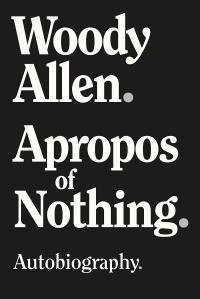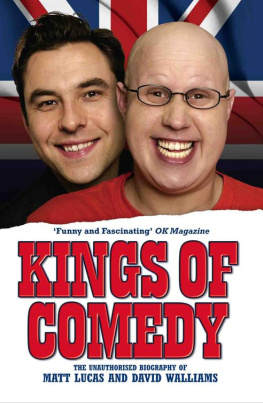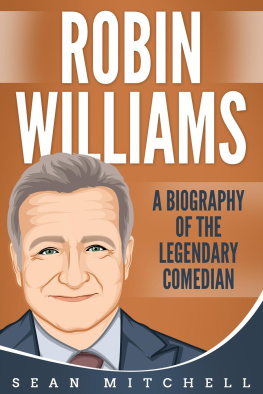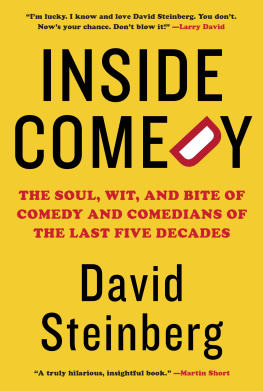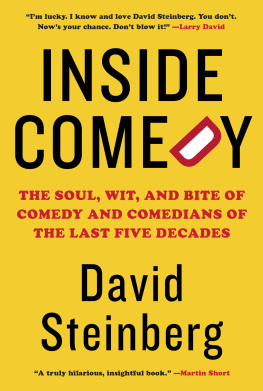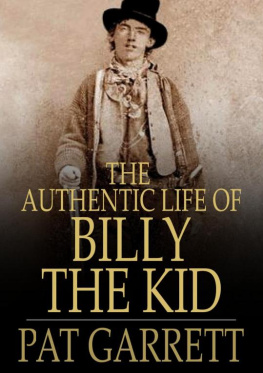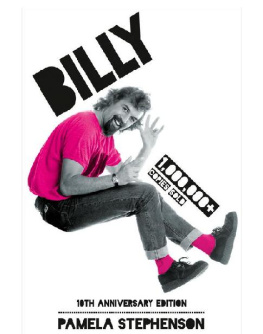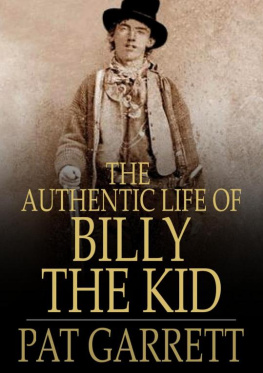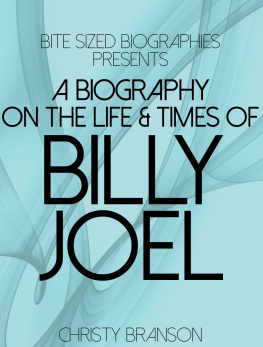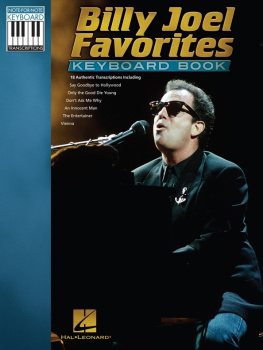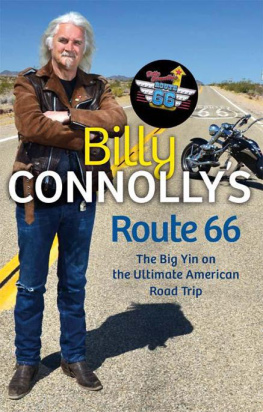INTRODUCTION
Billy Connolly is the most successful and popular British stand-up comedian of modern times, but he provokes a peculiar reaction in Scotland, in England, in America, Canada, New Zealand and Australia. Young people think he is a has-been, the middle aged that he is a never- was. The elderly still think he is too filthy, alternative comedy fans, that he is too clean, while hippies insist he is a sell-out. Journalists have a distinct downer on him, as do churchmen, local politicians in Glasgow, posh Edinburgh-ites, TV critics in the USA ... I could go on. But I shall simply repeat: Billy Connolly is the most successful and popular British stand-up comedian of modern times, wherein lies a lot of stories, anecdotes, recollections and theories.
This book would have been impossible without the Olympian research work of Bryony Coleman and Claire Coakley. Eternal thanks also to: Radio Clyde, the Glasgow Herald and Evening Times, the Associated Newspapers Library, the New York Public Library, the Motion Picture Academy Library and the American Film Institute Library, Los Angeles. I am hugely grateful to all the individuals who agreed to be interviewed and quoted by name, as I am to those who were keen to contribute to the book, but asked not to be identified. Gabrielle Morris, my assistant, put up with a lot; and Graham McOwan of The Lighter Side Bookshop, Upper Richmond Road West, London SW14, deserves special credit for giving me the idea of writing the first biography of one of my all- time heroes.
Jonathan Margolis
London, Glasgow, and Los Angeles, 1994
PREFACE
I always knew I could get to the top. Ive known it since I was a small boy. I knew I was a wee bit special.
Billy Connolly, talking to the Daily Mail, 6 May 1976
From the outside, the Great American Music Hall, as it is called with a hint of fashionable irony, is a scruffy theatre on a scuzzy street at the wrong end of San Franciscos theatre district. Billy Connollys name was up in lights this December evening in 1993, but they were not the worlds biggest or brightest lights, considering that the turn they were advertising was a prime-time TV star doing stand-up comedy for fun. The letters were spelled out in a crooked line, on a placard surrounded by revolving white torchbulbs.
Connollys advance billing on the San Francisco theatres forthcoming events pamphlet had been little more impressive, the name in letters one eighth of an inch high, the same size as those afforded to a group of Finnish folk artists, Varttina, and the Nate Ginsberg Big Band. But it was not a sign of failure at all. Billy Connolly had no need whatsoever to be here other than a love of his craft and a burning need for a live, intelligent audience.
Inside, the theatre was surprisingly grand, an Edwardian relic with marble columns, ornate balconies, mirrored walls and plenty of slighdy smoke-stained gilt work on its intricate ceiling. When it was built in 1907, Blancos, as it was known, was an exclusive restaurant and high-class bordello. It later became a posh cabaret venue. The Music Box.
Billy Connollys show was a sell-out, if only at the last minute, ticket sales having quickened in the final few hours before his opening night of three in San Francisco. The audience, mostly young and, although with a fair proportion of Scottish expatriates, principally American, sat drinking at round tables in the area that would once have been the stalls. When the tall Scotsman bounded onto the stage, beardless and wearing a black T-shirt and jeans, the applause, whistling and whooping was prolonged and rapturous. Billy Connolly may not be a big big name in the USA, but Connolly fans comprise an enthusiastic cult several times larger than the entire population of Scotland.
The comic paced the stage like a huge bear as the greeting noise showed no sign of abating, and indeed grew in volume. Oh. Oh, woah, woah, he shouted, the most familiar Glasgow accent in Britain sounding at once welcome and incongruous here on the West coast of America. Oh, shit, yeah, he went on. The racket began to die. I never know what to fucking do in this bit. The first laughter came, ten seconds after Connolly first opened his mouth, albeit aided by the strategic use of the word fuck.
He got eleven fucks and fuckings into the first minute and a half of his act, which warmed up the Americans, but seemed fractionally to embarrass some of the Scots. Perhaps some of the more out-of-touch expats had seen, in even tinier letters than Billy Connolly on the playbill, the words Scottish comedian, and had come expecting someone tame and harmless in a kilt. Although he is a teetotal vegetarian who avoids coffee, Billy Connolly is anything but tame and harmless, and, more important still, has never as far as the most detailed research can discover, either worn or confessed to wearing a kilt other than in the severest jest.
To the Big Yin, now in his early fifties and, despite an inner seriousness, miraculously still in touch with the childlike humour that finds farting an inexhaustible source of humour, fate must seem even more amusing having signposted his route from Partick to a home and a public on the West coast of the USA, via Buckingham Palace.
In 1952, aged ten, Connolly was amongst a crowd lining Glasgows Kelvin Way with his schoolmates, waiting to wave at the newly crowned Queen. He and his friends delighted at being let out of St Peters primary school for the occasion, and Billy was already standing out from the crowd in this case, in the sad sense of being the only child there without a Union Jack to wave.
She was coming up the road in the limo, he remembers, and all the kids were waving flags. And I didnt have one! But I had my dinner ticket for school, this bloody dinner ticket, so I drew a Union Jack on the back of this wee rectangular dinner ticket. I drew the lines in, just like a Union Jack. And there were a lot of bushes and trees and things in Kelvin Way, so I got a wee branch and poked it through my dinner ticket and waved it at the Queen, thinking I was being a great patriot.
Thirty-five years on, the young patriot from Partick was not just waving at the Queen, but helping direct her son and daughter-in-law away from protocol and towards celebrity partying, the late 1980s court jester, out on the town with the Duke of York, as his wife, Pamela Stephenson, persuades Fergie and the Princess of Wales to visit Annabels nightclub dressed in disguise.
Connollys path from flag-waving to frolicking with the young royals and living an LA lifestyle - is one of the best examples of rags to riches stories in the history of comedy. If it were made into a Hollywood film, Sean Connery would be roped in to star, given a highly implausible wig and beard, and even then criticized for a storyline beyond the realms of realism.
The reality is the true yarn of the Big Yin - a tale of comic talent triumphing over class, adversity and a Glasgow accent that would once have made him unacceptable south of Gretna Green, never mind in America. Connollys is a story begun in Glasgow tenements, developed in a Clydebank shipyard and folk clubs, taken on a world tour and currently based in Los Angeles, where its hero is engaged in the Sisyphean task of trying to succeed in the States when, despite five appearances on the David Letterman show, his name stubbornly remains a little unfamiliar to the public. It is not that Billy Connolly is unknown to Americans, but just that even after he has by any standards hit the big time, people there still need prompting to remember who he is. Whether it is the American next to you on a commuter flight, or the show business types gathered round a Hollywood restaurant table, the response to Connollys name is the same a furrow of the brow, followed by an awakening ... Oh, yeah, I really like him.
Connolly is probably the most famous Scot in Britain, but his is not the twee, shortbread-for-the-tourists Scotland, or even the con-temporary cool of the Edinburgh Festival. As a mid-1970s review in The Times of his London Palladium show put it: For him the Scottish national dress is not the kilt, but a pair of wellingtons, and the mark of class distinction is a childhood spent wearing wellies in summertime. Asked when he started to become famous in England, about the sense of community in Glasgow tenements, he replied, Sure, when theres sixty-five of ye sharing the toilet, it never has a cold seat.
Next page

